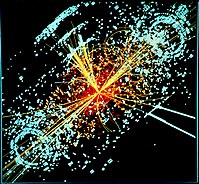
Photo from wikipedia
Quantum error correction was invented to allow for fault-tolerant quantum computation. Systems with topological order turned out to give a natural physical realization of quantum error correcting codes (QECC) in… Click to show full abstract
Quantum error correction was invented to allow for fault-tolerant quantum computation. Systems with topological order turned out to give a natural physical realization of quantum error correcting codes (QECC) in their ground spaces. More recently, in the context of the anti-de Sitter/conformal field theory correspondence, it has been argued that eigenstates of CFTs with a holographic dual should also form QECCs. These two examples raise the question of how generally eigenstates of many-body models form quantum codes. In this Letter we establish new connections between quantum chaos and translation invariance in many-body spin systems, on one hand, and approximate quantum error correcting codes (AQECC), on the other hand. We first observe that quantum chaotic systems obeying the eigenstate thermalization hypothesis have eigenstates forming approximate quantum error-correcting codes. Then we show that AQECC can be obtained probabilistically from translation-invariant energy eigenstates of every translation-invariant spin chain, including integrable models. Applying this result to 1D classical systems, we describe a method for using local symmetries to construct parent Hamiltonians that embed these codes into the low-energy subspace of gapless 1D quantum spin chains. As explicit examples we obtain local AQECC in the ground space of the 1D ferromagnetic Heisenberg model and the Motzkin spin chain model with periodic boundary conditions, thereby yielding nonstabilizer codes in the ground space and low energy subspace of physically plausible 1D gapless models.
Journal Title: Physical review letters
Year Published: 2019
Link to full text (if available)
Share on Social Media: Sign Up to like & get
recommendations!